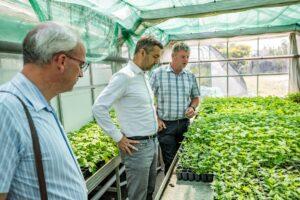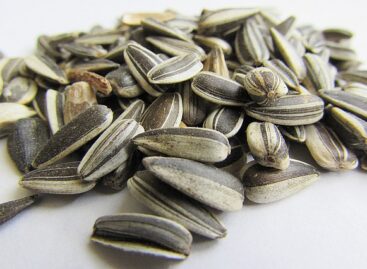They were engaged in the cultivation of berries in Fertőd
Although the size of berry fruit plantations has decreased in recent decades, according to the researchers, the cultivation of these crops, be it raspberries, currants or even blackberries, still has a right to exist in its traditional growing areas even in the changed climatic conditions.

(Photo: AM/Tibor Vermes)
During his visit to the Fertőd Research Station of the Fruit Growing Research Center of the Hungarian University of Agriculture and Life Sciences, Zsolt Feldman consulted with researchers, area development and agricultural experts on how to help the cultivation of domestic berry fruits more effectively. From a professional point of view, everything is based on the right variety and the developed growing technology associated with it, for which the Fertőd station has professional knowledge and propagating material. According to experts, the domestic average yield can be doubled with the right variety and technology. The West Nógrád Regional Development Center can provide assistance in conveying this knowledge to the producers, the workers there are primarily related to producers from Nógrád County. At the meeting, it was said that in the past period, the Rural Development Program’s tender opportunities for horticulture sectors were able to provide assistance for the establishment and mechanization of berry fruit plantations, and this will be the case in the new tender system as well. In this sector as well, the management of the labor shortage is a central issue, for which, according to what was said at the meeting, harvesters are already available on the European market, which are able to harvest even raspberries intended for fresh market sale with a care close to manual picking, and thus can make this interesting again for a wider range of producers. the culture.
At the research station in Fertőd, there is also a professionally interesting technological experiment related to the production of raspberries within the framework of agro-forestry systems
This means cultivation with shading by a noble poplar tree. The low-cost solution provides shade and reduced evaporation, thus protecting the plant and having a beneficial effect on yields. The experts working at the research station – continuing the breeding work of their predecessors – in addition to the traditional varieties proven in Hungary, are constantly looking for newer varieties that are better adapted to the changed climatic conditions, as well as new ways of plant protection. The Secretary of State indicated to the researchers and agricultural experts participating in the meeting that new tools will be available to assist in the transfer of information and knowledge to interested farmers in the new cycle of the Hungarian Common Agricultural Policy Strategic Plan, which is starting now.
AM
Related news
The Ministry of Agriculture has issued a notice on the use of ENAR data in support policy
In the case of animal-based subsidies financed from EU funds,…
Read more >Farmer-centric agricultural policy after 2027 receives unanimous support
The EU member states’ agriculture ministers have adopted Council conclusions…
Read more >Slow but steady growth in sunflower producer prices
Oil World experts expect a global sunflower seed harvest of…
Read more >Related news
The Christmas season is starting earlier and earlier: value for money is the key
This year, 40 percent of Hungarians brought their Christmas shopping…
Read more >The SZÉP card will also be available in digital form from 2025
From September 1, 2025, a significant change will come into…
Read more >SHEIN’s first Hungarian store has opened
On December 10, 2024, at noon, SHEIN’s first Hungarian store…
Read more >







